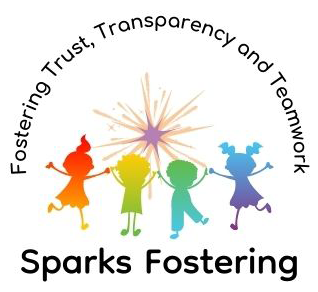Vision, Values and Objectives
Sparks fostering Vision
Sparks Fostering aspires to create a culture whereby children and young people in our care are given every opportunity to thrive and recover from trauma. Every child placed into the care of a Sparks Fostering home will quickly see that they are part of an organisation that works together to meet the needs of every member of the organisation, including staff, foster carers and children. This will be made possible by establishing a well trained, highly motivated team who feel pride and a great sense of achievement for their contribution to the lives of the children looked after.

Sparks Fostering values and principles
Sparks Fostering staff and foster carers understand that whenever possible, children are best looked after within their families, with their parents playing a full part in their lives. However, compulsory intervention in family life is sometimes necessary in order to safeguard a child and promote their welfare.
Sparks Fostering aims to, where possible, support rather than undermine the parental role. The significance of contact for children looked after, and of maintaining relationships with birth parents and the wider family, including siblings, halfsiblings and grandparents, is recognised, as is the foster parent’s role in this.
Children should have an enjoyable childhood, benefiting from excellent parenting and education, enjoying a wide range of opportunities to develop their talents and skills leading to a successful adult life.
Children are entitled to grow up in a loving environment that can meet their developmental needs.
Every child should have his or her wishes and feelings listened to and taken into account. The child’s wishes and feelings should always be established and taken into account when taking decisions in respect of children looked after.
The particular needs of disabled children and children with complex needs will be fully recognised and taken into account
Each child should be valued as an individual and given personalised support in line with their individual needs and background in order to develop their identity, self-confidence and self-worth.
Children in foster care deserve to be treated as a good parent would treat their own children and to have the opportunity for as full an experience of family life and childhood as possible, without unnecessary restrictions.
Foster parents are required by their Foster Care Agreement to care for any child placed as if the child was a child of the foster parent’s family. The default position should be that the foster parent does not treat the child differently to their own children.
Foster parents have an important contribution to make in planning and decision making about the child
The central importance of the child’s relationship with their foster parent is acknowledged and the work of the wider team around the child will be undertaken in a way that strengthens and supports the role of the foster parent.
Foster parents are recognised as having (or developing) the skill, knowledge, expertise, self-awareness, commitment and the ability to work as part of the team around the child
Sparks Fostering and responsible authorities must value and promote the central role of foster parents as part of the wider team, not just caring for and supporting the child, but also contributing to planning for the child, for example through attending reviews and meetings with other professionals concerned with the child.
Foster parents have a right to full information about the child
The status of foster parents is respected, and their levels of authority clearly defined so that they can give children in their care a full experience of family life, safeguard them and help them to grow and reach their potential. The central importance of the child’s relationship with their foster parent is acknowledged and foster parents should be recognised as core members of the team working with the child
Foster parents receive relevant support services and development opportunities in order to provide the best care for children
Genuine partnership between all those involved in fostering children is essential; this includes the Government, local government, other statutory agencies, fostering service providers and foster parents.
Further Information
Our main objectives
Matching Fostering Families With Children In The Care Of The Local Authority
Sparks Fostering is an independent fostering provider which matches fostering families with children in the care of the local authority who are aged between 0 to 18 years (although foster parents will be encouraged to care for children beyond this age whenever this is possible).
Meeting The Needs Of Children
Recruitment of foster parents is geared towards meeting the needs of children who are waiting for placement; therefore, reasonable effort will be made to ensure the demographics of foster parents reflect the diversity of children who are waiting for fostering placements.
Strategically Recruit And Assess Prospective Foster Parents
The main tasks for Sparks Fostering are to strategically recruit and assess prospective foster parents; to train the parents so they are able to offer the best level of care to the children; to match children to the homes which are most likely to suit the needs of the child; to support the foster parents and children as build their relationship; to supervise foster parents and staff; and to continue to offer support, training and supervision to staff and foster parents for as long as the placement lasts. All of these core functions are expanded upon in considerable detail in later policies and procedures and will be central to the training topics offered to foster parents, other fostering family members, and to Sparks Fostering staff.







